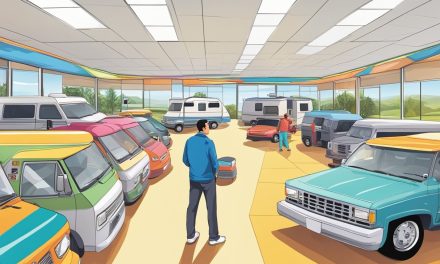So you thought buying an RV meant ultimate freedom on the open road? Think again! The moment you sign those papers, you’re basically enrolling in a crash course of bizarre legal technicalities that’ll make your head spin. From where you can sleep to what you can cook while driving, America has some seriously strange rules for RV owners.
These laws are so weird, you’ll wonder if lawmakers have ever actually been camping. Get ready to discover the most absurd regulations that could turn your dream vacation into a legal nightmare. Buckle up (literally—it’s probably required by law somewhere)!
Would you like to save this article?
1. Sleeping in Your Own Driveway is Illegal
Picture this: You just dropped serious cash on a beautiful RV, tow it home, and decide to test it out in your own driveway. Sounds reasonable, right? Wrong. In states like Virginia and North Carolina, sleeping in your RV on your own property is actually illegal.
The logic? Cities don’t want “temporary structures” becoming permanent residences. According to local zoning laws, many municipalities classify occupied RVs as temporary housing, which violates residential zoning codes. Translation: They’re worried your brother-in-law will move in and start hosting shirtless BBQ parties in the cul-de-sac.
| State | Restriction | Penalty |
|---|---|---|
| Virginia | No sleeping in RVs on residential property | Fines up to $250 |
| North Carolina | Maximum 2 consecutive nights in driveway | Daily fines after violation |
Here’s the kicker: You’re technically breaking the law by sleeping 20 feet from your front door, but your neighbor welding in his underwear at 3 AM? Totally legal. Meanwhile, the poor police officer who gets called to enforce this has to explain that the real crime is you getting a good night’s sleep in a vehicle you legally own.
2. Walmart Overnight Parking Bans
Walmart parking lots have become legendary among the RV community—a sacred ground where you can restock, refuel, and catch some Z’s without paying KOA’s $89 nightly rate. But here’s the plot twist: Not all Walmarts allow it anymore. States like New York, Colorado, and Florida have locations that ban overnight parking entirely.
The “Walmart overnight” phenomenon started in the 1980s when founder Sam Walton encouraged RVers to stay. However, local ordinances have slowly restricted this practice. According to the Recreational Vehicle Industry Association (RVIA), approximately 30% of Walmart locations across the U.S. now prohibit overnight RV parking due to local laws.
You’ll find dedicated RV forums where people call stores ahead asking, “Excuse me, sir, am I allowed to exist in your parking lot tonight?” The irony? While you can’t sleep in your $100,000 motorhome outside, someone’s inside at 4 AM snoozing on a display recliner in the furniture section. Apparently, napping on merchandise is more acceptable than paying customers sleeping in the lot.
3. Your Pet Must Be Restrained While Riding
Love traveling with Fido in your RV? Better buckle up that furry copilot! States like California, Connecticut, and Hawaii have laws requiring pets to be properly restrained while the vehicle is in motion. Yes, even in your own RV.
The science actually makes sense here. According to AAA Foundation for Traffic Safety, an unrestrained 10-pound dog in a crash at just 50 mph exerts approximately 500 pounds of force—basically a furry cannonball with teeth. A 20-pound pet? You’re looking at serious injury potential.
| Pet Weight | Force at 50 MPH Crash | Equivalent Impact |
|---|---|---|
| 10 lbs | 500 lbs | Small elephant |
| 20 lbs | 1,000 lbs | Grand piano |
| 80 lbs | 4,000 lbs | Adult male elephant |
Try explaining seat belt laws to your Labrador, though. Strap a harness on that good boy and suddenly you’re in a full hostage negotiation. You’ll probably hear some version of “No, officer, this isn’t reckless driving—this is my emotional support airbag!” when you inevitably get pulled over with Rover on your lap.
4. Cooking While Driving is Prohibited
Ever dreamed of preparing a gourmet meal while cruising down the interstate at 65 mph? Well, Washington State and several others say absolutely not! It’s illegal to cook in a moving RV in multiple jurisdictions across the country.
This law didn’t just appear out of thin air. Someone, somewhere, was definitely sautéing onions on I-5 when they caused an accident. Fire safety data from the National Fire Protection Association (NFPA) shows that cooking equipment is involved in 49% of home fires—and your RV is basically a home on wheels.
Imagine the police report: “Sorry, officer, I didn’t see the speed limit sign. I was distracted by my wife’s risotto.” This is probably the most practical law on this entire list. Nothing destroys your RV’s resale value faster than chili splattered across the carpet during a sharp turn. That’s a smell that requires an exorcist, not Febreze.
5. Sunday Towing Restrictions
Planning a weekend getaway? Better not leave on Sunday if you’re in Rhode Island! This tiny state still enforces “blue laws” that prohibit towing your RV on Sundays without a special permit. Yes, you read that right.
These regulations are leftovers from colonial-era “blue laws” designed to enforce religious observance by prohibiting work and commerce on Sundays. According to the Rhode Island General Laws § 5-22-1, recreational vehicle towing falls under restricted Sunday activities. While enforcement is rare, the law technically remains on the books.
Let’s think about this logically: You can’t sleep in your driveway in Virginia. You can’t tow on Sunday in Rhode Island. So basically, the only legal time to use your RV is never. You might as well park it permanently and convert it into an expensive garden shed. At least then you won’t accidentally commit a crime while trying to go camping.
6. Dumping Dish Water on the Ground is a Crime
Hold up—we’re not talking about sewage here. States like Minnesota, New Hampshire, and California make it illegal to dump even dish water on the ground. Not black tank waste. Not gray water. Just your regular spaghetti-water rinse.
The environmental science is actually solid. According to the Environmental Protection Agency (EPA), dish soap contains phosphates and surfactants that disrupt aquatic ecosystems, causing algae blooms and harming fish populations. Even biodegradable soap can alter water pH levels and oxygen content.
| Substance in Dish Water | Environmental Impact |
|---|---|
| Phosphates | Causes algae blooms, depletes oxygen |
| Surfactants | Toxic to aquatic life |
| Food particles | Attracts pests, disrupts wildlife |
But try explaining this to a ranger when you’re just rinsing out your morning coffee cup! “No, officer, I wasn’t polluting the river—that’s just lasagna runoff!” Meanwhile, you’re standing there wondering if you need a PhD in environmental science just to wash a fork. Who knew spaghetti water could turn you into an eco-terrorist?
7. Montana’s Horse Has Right-of-Way Law
Welcome to Montana, where horses outrank your diesel pusher! According to Montana state law, if a horse gets spooked by your RV, you must pull over, shut off your engine, and wait for the rider to wave you past. Your $100,000 motorhome is legally subservient to a $40 saddle.
This law has historical roots in Montana’s ranching heritage. The Montana Code Annotated § 61-8-213 requires drivers to yield to “frightened animals” and take reasonable precautions. Given that Montana has over 160,000 horses (roughly 1 horse for every 7 people), this isn’t just quirky—it’s practical for preventing accidents.
Here’s what makes this hilarious: Horses spook at literally everything. They’re basically 1,200-pound muscular toddlers with hooves. A plastic bag? Terrifying. A shadow? Potentially deadly. So at any moment, you could be legally detained by an animal with the emotional stability of a drama student. Forget negotiating with terrorists—in Montana, you’re negotiating with Mr. Ed.
8. Texas Requires a Written Waste Disposal Plan
Everything’s bigger in Texas—including the paperwork for your poop. Certain counties in the Lone Star State actually require RV owners to have a written, documented plan for waste disposal. That’s right: Someone’s job is to review your sewage strategy.
This regulation emerged from increasing problems with illegal dumping by van-lifers and sketchy RVers. The Texas Commission on Environmental Quality (TCEQ) reports that illegal RV waste dumping causes groundwater contamination and public health hazards. Counties like Travis and Williamson now require documented disposal plans for extended stays.
Imagine this conversation: “Hey honey, can you run to the store? We need milk, bread, and a waste flow management diagram with diagrams.” Apparently, saying “eventually a gas station” doesn’t cut it as a written plan. You’ll need flowcharts, timestamps, and possibly a notary public just to prove you know where a dump station is.
9. Open Container Laws in RVs (Your Fridge Might Be Illegal!)
Pop quiz: When is a beer a crime and when is it just “domestic consumption?” Answer: It depends which seat you’re sitting in. Many states have confusing open container laws that treat your RV as both a vehicle AND a house—sometimes simultaneously.
According to the National Highway Traffic Safety Administration (NHTSA), 40 states have open container laws prohibiting unsealed alcohol in vehicles. But RVs exist in a legal gray area. The Federal Motor Carrier Safety Administration classifies them as recreational vehicles, not commercial vehicles, creating inconsistent enforcement.
| State Approach | RV Alcohol Rules | Example States |
|---|---|---|
| Strict Vehicle Classification | No open containers anywhere while moving | New York, Pennsylvania |
| Living Area Exception | Open containers OK in back, not cab | California, Oregon |
| Relaxed Enforcement | Generally permissive when parked | Louisiana, Mississippi |
So here’s the absurdity: Beer in the front seat while driving? That’s a DUI waiting to happen. Same beer in the back bedroom? That’s just Tuesday. If a cop asks if you’re drinking and driving, your best defense is: “No, officer—I’m drinking and living!”
The safest bet? Keep all alcohol sealed while the wheels are turning. If you want to crack open a cold one, move to the back and hand your spouse the wheel. Just make sure they’re not drinking and living too. In Louisiana, you could probably operate a margarita machine on the dashboard while frying catfish, and they’d just wave you on through. Everything else is a legal minefield disguised as a road trip.
Final Thoughts: Freedom Comes with Fine Print
RVing is supposed to be about making memories, not making bail. But as you can see, the “freedom” of the open road comes with more asterisks than a cell phone contract. Who knew that buying a motorhome meant signing up for law school?
Before you hit the road, take time to research state and local regulations. Check if Walmart allows overnight parking in your area. Keep your pets properly restrained (even if they give you the sad puppy eyes). And for the love of all things camping, don’t turn your driveway into an unauthorized Airbnb.
At the end of the day, the real adventure isn’t the road trip itself—it’s successfully avoiding fines in all 50 states. Now get out there and explore America’s highways! Just remember: that beer stays sealed until you’re parked, your horse negotiations are polite, and your waste disposal plan is notarized in triplicate.
SOURCES
- Original Video: Top 9 Dumbest RV Laws That Still Exist – The Camping Loop
- Recreational Vehicle Industry Association (RVIA): https://www.rvia.org/
- AAA Foundation for Traffic Safety – Pet Safety Research: https://aaafoundation.org/
- National Fire Protection Association (NFPA) – Cooking Fire Statistics: https://www.nfpa.org/
- Rhode Island General Laws: http://webserver.rilegislature.gov/Statutes/
- Environmental Protection Agency (EPA) – Water Quality: https://www.epa.gov/
- Montana Code Annotated – Vehicle Laws: https://leg.mt.gov/bills/mca/
- Texas Commission on Environmental Quality (TCEQ): https://www.tceq.texas.gov/
- National Highway Traffic Safety Administration (NHTSA): https://www.nhtsa.gov/
- Federal Motor Carrier Safety Administration: https://www.fmcsa.dot.gov/







